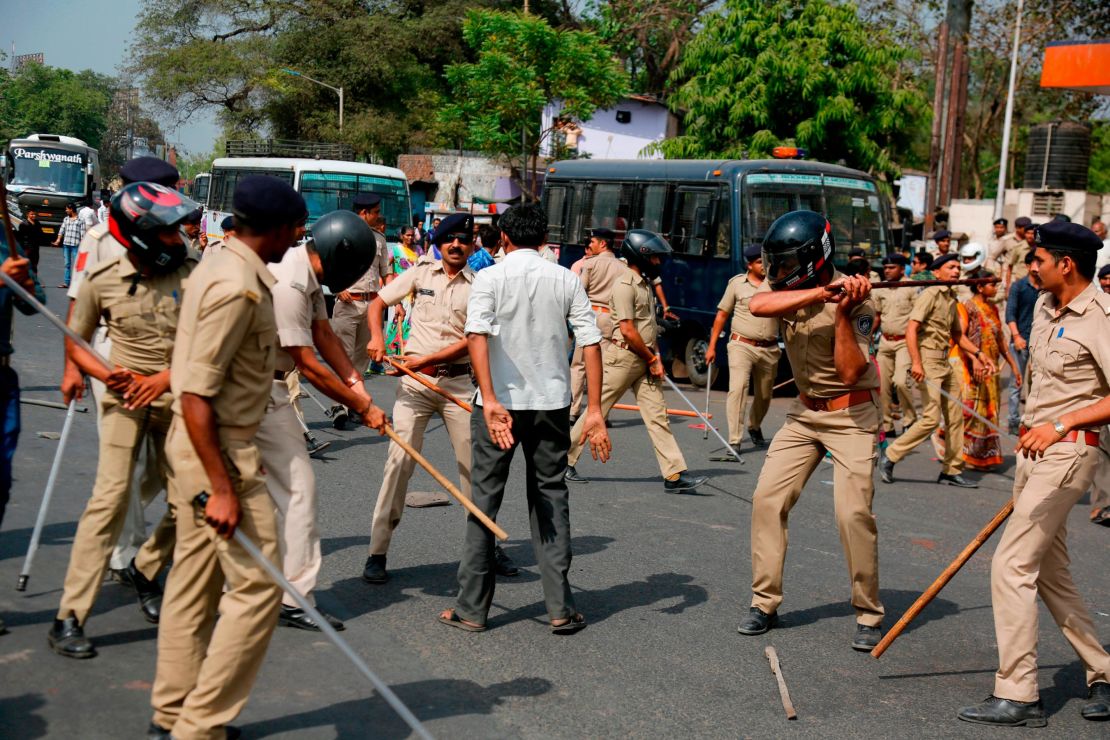One year ahead of the next general elections, India’s ruling Bharatiya Janata Party (BJP) got into campaign mode by staging a 300,000-strong rally in Mumbai.
The massive rally in the country’s financial capital on Friday, was a move seen as a show of strength ahead of expected general elections, which are due by May 2019.
The rally was fronted by the BJP’s powerful president, Amit Shah, a close friend of Prime Minister Narendra Modi, who used the platform to hammer Opposition party chief Rahul Gandhi, taunting him Gandhi with the nickname, “Rahul Baba,” which can mean “baby” in Hindi.
Shah also used the opportunity to praiseModi’s four years of governance, rattling off the names of various government programs.
“We came into government, not for the pleasure of being in power, but to use it as the medium of power to work for the welfare of the poor,” he told the gathering, many of whom were ferried to the city on the thousands of buses and 28 trains the BJP had booked to transport its supporters.
Modi, in a tweet Friday called the BJP “the party of a New India”.
“We are privileged to receive the blessings of people of all age groups, across all sections of society.”
BJP swept to power in 2014 with promises to boost income levels, but two disruptive policy changes slightly dented the party and the prime minister’s popularity.
The first was when Modi stunned the country in November 2016 by abruptly banning its two largest currency notes, leading to a sharp slump in many sectors of India’s cash economy.
The second was a landmark overhaul of the tax system last July, which disrupted businesses as many companies struggled to adapt to the new regime.
However, Modi is expected to weather these storms. In a survey published in November – but conducted before he overhauled the tax system – nearly nine out of 10 Indians said they were happy with the prime minister, while eight in 10 were happy with the state of the economy.
Bellwether state elections loom
This year, ahead of 2019’s national elections, polls will take place in the state of Karnataka in the south; Mizoram, Meghalaya, Nagaland and Tripura in the northeast; Madhya Pradesh and Chhattisgarh in the country’s center; and Rajasthan – a state that has had alternating governments since 1990 and is currently ruled by the BJP – in the west.
State elections are often seen as key political tests for the ruling party ahead national elections and are crucial at national level because each state nominates a proportional number of representatives to India’s upper house of parliament.
While the BJP has a clear majority in the lower house, it is underrepresented in the upper house, which has stymied some of its reform proposals.

In December the BJP retained power in Modi’s home state of Gujarat, but only by a whisker.
It was the party’s worst performance at a state election in Gujarat in more than two decades, with analysts pointing to widespread dissatisfaction over Modi’s recent economic policies as a primary reason for the drop in poll numbers.
Accusations of Hindu nationalism
Modi’s tenure has also prompted criticism for fostering Hindu nationalism. In 2016, a number of Indian writers returned their literary awards in protest over what they called a growing climate of intolerance and threats to free speech under his Hindu nationalist government.
Their action came after the murder of a Muslim man suspected of eating beef in Hindu-majority India. Some BJP officials suggested that Muslims should not eat beef or otherwise offend the religious sensibilities of Hindus, who consider cows to be sacred.
However, there are those that say this is exactly why Modi is so popular.
“Modi is still one of the most popular leaders in the country precisely because people see him as a Hindu hriday samrat – ruler of the Hindu heart,” said Mohammad Ali, a reporter with The Hindu, a national newspaper. “Irrespective of how the government is doing, he is still one of the most popular leaders.”
The previous year, the head of the country’s central bank made an appeal for tolerance, warning the economy will never reach its potential if debate is stifled.

Earlier this week, India’s Supreme Court agreed to hear an appeal against one of its rulings that sparked deadly protests by lower-caste Indians.
The court’s judgment led to fierce opposition from critics who said it would weaken protections for the country’s Dalit and other low-caste communities.
“The protests will likely dent the BJP’s image with Dalit voters, as opposition parties will look to exploit the events and paint Modi as anti-minority,” said Shailesh Kumar, an analyst at the Eurasia Group think tank.
CNN’s Edwin Thomas and Huizhong Wu contributed to this report.



